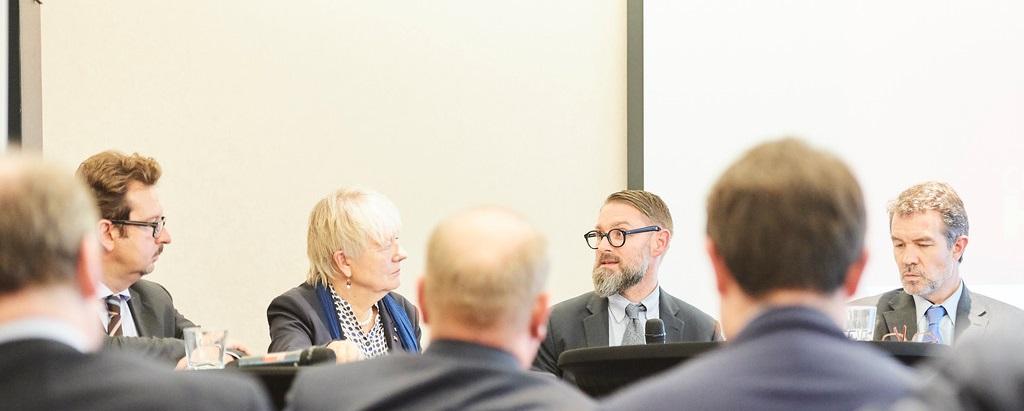As global polio eradication efforts draw nearer to eliminating the disease worldwide, many voices in the global health community are calling for greater attention to the financial, programmatic, and structural risks associated with the polio transition. The opportunities and challenges that this transition will bring following the endgame represent one thematic focus of the Global Health Centre’s (GHC) ongoing research on the political barriers to polio eradication in the European context. From a governance perspective, the successful eradication of polio will raise important questions of future ownership and accountability with regard to translating the lessons learned, knowledge, and assets from polio programming to support wider health agendas, such as health systems strengthening and global health security. The GHC had the opportunity to explore some of these linkages in more depth at policy dialogues in Brussels and Berlin, as well as at the 2017 Humanitarian Congress in Berlin this fall.
Beyond the delivery of polio vaccinations, global polio eradication efforts have contributed to the provision of many other health services to the world’s most inaccessible and vulnerable populations. However, once eradication is achieved, it is likely that the capacities and assets built through polio efforts will not be maintained unless polio is brought out of the development silo and substantively connected to the health systems strengthening agenda. This was one of the central themes discussed at a policy dialogue and high-level dinner co-hosted by the GHC and Rotary International in the heart of European policy-making in Brussels. The European Parliament, Commission and External Action Service strongly support the need for country-led transitioning, including national investment and commitment to building stronger health systems; this then means that the European Union must also consider potential avenues for further support to polio functions at regional and global levels, beyond current commitments to the polio endgame. The political barriers to advancing the polio transition on the European agenda include that health is considered a primarily national competency; the acknowledged link between polio assets and health systems strengthening has yet to be operationalised at the institutional level; and despite efforts to foster cross-sectoral collaboration in EU initiatives, polio eradication remains categorised as an international development project within the Directorate-General for International Cooperation and Development (DG DEVCO). Participants at the dialogues in Brussels highlighted that there may be important opportunities to mitigate some of these barriers if space for polio eradication, or global health more broadly, is secured within negotiations for the EU’s post-2020 policy instruments. However, among many competing interests and with health seen at the periphery of the EU’s multi-lateral competencies, strong and supportive Member State voices will be required if polio transitioning is to gain any political traction within the EU.
The policy dialogue held in Berlin and co-hosted by the GHC, Rotary International and the World Health Summit, emphasised the importance of completing eradication to safeguard the extensive investments already made towards achieving this global public good for health. Important polio infrastructure, such as laboratory networks and surveillance systems, will be critical to transfer and maintain as pillars of resilience and health security. This connection between polio assets and health security architecture is frequently cited as a political mechanism which could bridge national and global interests in global health. Despite current political uncertainty, global health is seen to have wide, cross-party support in Germany. Cutting across the competencies of the Federal Ministries of Economic Cooperation and Development, Health, and Foreign Affairs, the polio endgame and transition offers an opportunity for renewed and continuing German leadership in global health in a multi-sectoral arena. Nonetheless, parliamentarians echoed similar challenges to those voiced in Brussels; namely that polio eradication is not seen as an issue of domestic or even regional concern. In order to generate wider attention and prioritisation of the polio transition among EU actors and Member States, politicians will need to emphasise not only the directly relevant issues such as vaccine coverage within their constituencies, but also the value of universal eradication as a global public good for health, and the potential impact of the polio legacy for wider agendas such as health security. While Germany has been a longstanding supporter of global polio eradication, transition is still framed largely as an issue of national ownership and financing, with discussions of how the global system will cope remaining under-examined. It is therefore unclear whether Germany’s continuing leadership in global health will encompass a prominent role ensuring that adequate governance mechanisms are in place to support a sustainable polio transition at global and regional levels.
As discussed during the Berlin Humanitarian Congress, polio initiatives have operated across divisions of humanitarian vs. development, and vertical vs. horizontal programs. Requiring political support that is long-sighted and cross-sectoral, the transitioning of this parallel health initiative to contribute sustainably to stronger health systems and security could serve as a testing ground for the broader Sustainable Development Goals for 2030. Falling back to siloed ways of thinking about polio as an international development issue, or a vertical health program, will no longer suffice.
Written by J. Piper, M. Told, F. Kurihara and S.A. Matlin


